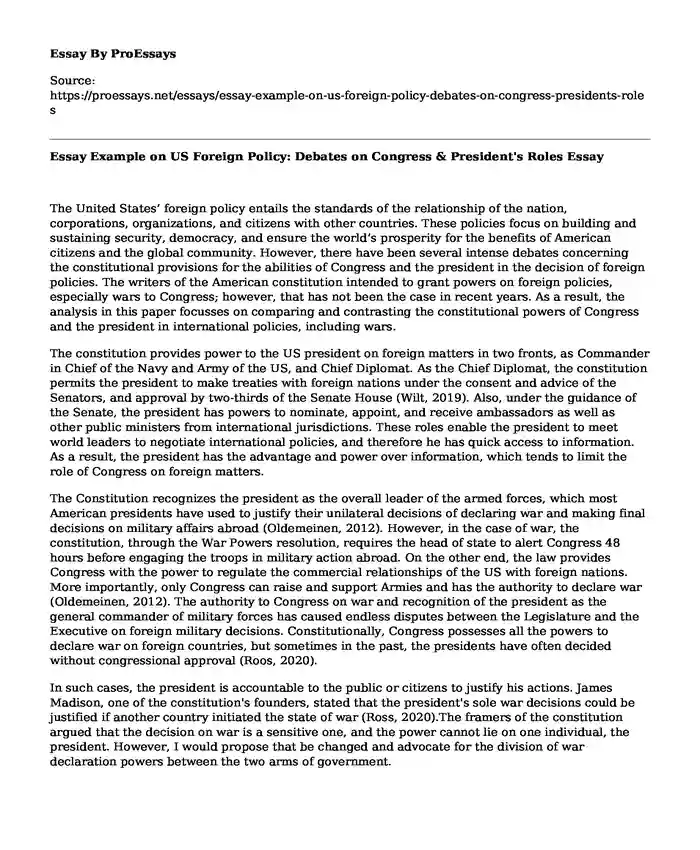The United States’ foreign policy entails the standards of the relationship of the nation, corporations, organizations, and citizens with other countries. These policies focus on building and sustaining security, democracy, and ensure the world’s prosperity for the benefits of American citizens and the global community. However, there have been several intense debates concerning the constitutional provisions for the abilities of Congress and the president in the decision of foreign policies. The writers of the American constitution intended to grant powers on foreign policies, especially wars to Congress; however, that has not been the case in recent years. As a result, the analysis in this paper focusses on comparing and contrasting the constitutional powers of Congress and the president in international policies, including wars.
The constitution provides power to the US president on foreign matters in two fronts, as Commander in Chief of the Navy and Army of the US, and Chief Diplomat. As the Chief Diplomat, the constitution permits the president to make treaties with foreign nations under the consent and advice of the Senators, and approval by two-thirds of the Senate House (Wilt, 2019). Also, under the guidance of the Senate, the president has powers to nominate, appoint, and receive ambassadors as well as other public ministers from international jurisdictions. These roles enable the president to meet world leaders to negotiate international policies, and therefore he has quick access to information. As a result, the president has the advantage and power over information, which tends to limit the role of Congress on foreign matters.
The Constitution recognizes the president as the overall leader of the armed forces, which most American presidents have used to justify their unilateral decisions of declaring war and making final decisions on military affairs abroad (Oldemeinen, 2012). However, in the case of war, the constitution, through the War Powers resolution, requires the head of state to alert Congress 48 hours before engaging the troops in military action abroad. On the other end, the law provides Congress with the power to regulate the commercial relationships of the US with foreign nations. More importantly, only Congress can raise and support Armies and has the authority to declare war (Oldemeinen, 2012). The authority to Congress on war and recognition of the president as the general commander of military forces has caused endless disputes between the Legislature and the Executive on foreign military decisions. Constitutionally, Congress possesses all the powers to declare war on foreign countries, but sometimes in the past, the presidents have often decided without congressional approval (Roos, 2020).
In such cases, the president is accountable to the public or citizens to justify his actions. James Madison, one of the constitution's founders, stated that the president's sole war decisions could be justified if another country initiated the state of war (Ross, 2020).The framers of the constitution argued that the decision on war is a sensitive one, and the power cannot lie on one individual, the president. However, I would propose that be changed and advocate for the division of war declaration powers between the two arms of government.
Conclusion
I would suggest the provision of some constitutional powers declaring war to the president. It is because Congress is often slow in making a decision and could subsequently delay the country’s response during emergency attacks. In the case of emergencies and public demand, the constitution should allow the president to declare quick military action without the consent of the Congress, to ensure security and protection of public interests (Roos, 2020). My proposal would also allow the Executive to make urgent calls on wars when Congress is out of their sessions.
References
Roos, D. (2020, January 15). US presidents and Congress have long clashed over war powers. History.com. https://www.history.com/news/us-presidents-war-powers-congress
Oldemeinen, M. (2012, September 11). How dominant is the president in foreign policy decision-making? E-International Relations. https://www.e-ir.info/2012/09/11/how-dominant-is-the-president-in-foreign-policy-decision-making/
Wilt, M.W. (2019). The president, foreign policy, and war powers: A survey on the expansion and setbacks of presidential power. Channels: Where Disciplines Meet, 3(2): 30-51. https://digitalcommons.cedarville.edu/channels/vol3/iss2/3/
Cite this page
Essay Example on US Foreign Policy: Debates on Congress & President's Roles. (2023, Sep 10). Retrieved from https://proessays.net/essays/essay-example-on-us-foreign-policy-debates-on-congress-presidents-roles
If you are the original author of this essay and no longer wish to have it published on the ProEssays website, please click below to request its removal:
- Essay on Documentary Analysis: 13th (2016), The Mask You Live In (2015)
- Research Paper on The Red Guards
- The Economic Implications of Government Control Over the Interest Rates Essay
- Essay Sample on Canada and Germany Food Trade
- Human Freedom: Enhancing and Limiting Factors - Essay Sample
- US Diplomacy: Leveraging Friendship & Mutual Understanding - Essay Sample
- Report Sample on President Duterte 10-Point Agenda







